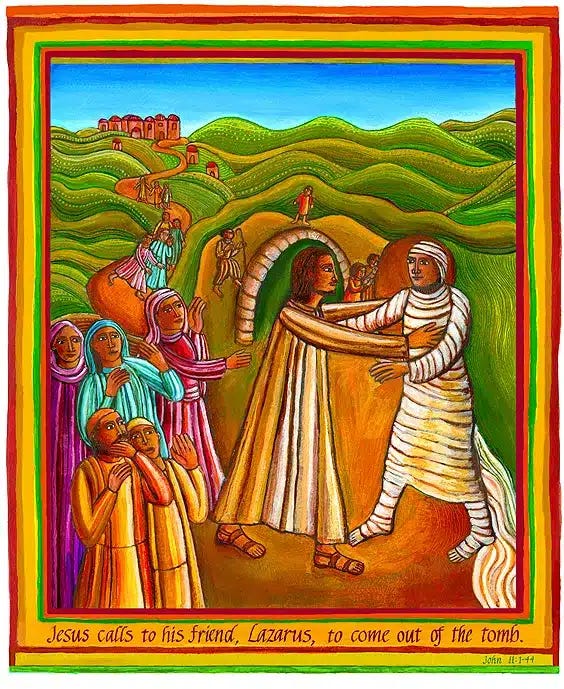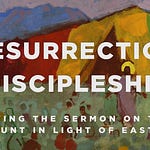We finally made it. It is the fifth Sunday in Lent, and Lazarus has been raised. Jesus told his disciples, “Lazarus is dead. For your sake I am glad I was not there, so that you may believe. But let us go to him.”[i] From the very beginning, the raising of Lazarus is intended to reveal to those with ears to hear and eyes to see the fullness of the glory of God. With a “loud voice,”[ii] Jesus called Lazarus to “come out!”[iii] and the man who had the stench of four days of death came forth from the tomb.
You know the “rules” for our study, but if you have forgotten them, let’s do a quick review. As we study this text, we do not look for empirical evidence. For example, Jesus commands Lazarus to be unbound after Lazarus exits the tomb. How did Lazarus get out if he was bound? That’s not the point of the story, and if we get bogged down in that, then we are missing the bigger story of God’s glory.
I want us to remember that our holy scriptures contain “all things necessary for salvation.”[iv] God spoke through writers generations ago and continues to speak to us today.
Alright, open your Bibles, and let's dive in!
We have heard the story read, but here’s my paraphrasing of what happened.
Lazarus and his sisters, Mary and Martha, live in Bethany. The sisters send word to Jesus that Lazarus is sick. Jesus is on the other side of the Jordan River, which delays his departure for Bethany. He waits two days. When Jesus arrives, Lazarus has been dead for four days. Martha shows faith that Jesus can correct the situation, while Mary is less than impressed. Next, we get the emotional interlude – Jesus weeps. Jesus asks for the tomb's stone to be moved and calls, “Lazarus, come out!”[v] Lazarus leaves his tomb, and his burial clothes are removed. It was a miraculous moment that moved observers to faith in Christ and simultaneously set into motion the events that will transpire against Jesus.
Our focus today is on verses 38-44.[vi]
Jesus arrives at Lazarus’s tomb and lifts a prayer to God after asking for the stone to be moved. In his prayer, Jesus prays that those witnessing this event would believe that God indeed sent Jesus and that Jesus is God in human form. After Jesus prays, he calls for Lazarus to come out of the tomb. Lazarus comes out unbound – the end.
What a dramatic scene it must have been. All who heard, smelled, and saw what happened must have been in awe of what they had witnessed. Yet, we do not have an account from Mary or Martha, from Lazarus, or any of the other witnesses. If Jesus intended to move onlookers to believe in him, would we not expect to hear that from the gospel writer?
In other raisings and healings, we have a response from the recipient of Jesus’s words and actions, along with onlookers. A man with an unclean spirit was told to go home and tell everyone what the Lord had done for him.[vii] There is another healing where the onlookers praised God after seeing Jesus raise a widow’s son in Nain, resulting in Jesus’s name spreading “throughout Judea and all the surrounding country.”[viii]
But at the raising of Lazarus, we do not read a response – from Mary or Martha, from Lazarus, from any of the other witnesses, or Jesus for that matter.
Consider Jesus’s words to Lazarus for a moment. To bring Lazarus out from death only requires three words – “Lazarus, come out!”[ix]
Lazarus, leave behind the death breath and get out here.
Lazarus, death may have said you were finished, but I, the One who spoke creation into existence, says to come out.
Don’t we all wish we could come out from whatever it is that is holding us back? Holding us down? To come out from whatever is telling us we are not enough, that we should be something or someone different from who God made us to be, is an occasion of liberation.
In Come Forth, author and Jesuit priest James Martin writes, “Come out! is an invitation to all people who feel that they are not enough. That they are inadequate. Or even that they are a ‘mistake.’ These feelings and beliefs are something to leave behind in the tomb because they are a kind of death. Feelings of not enoughness can be death to the spiritual life because you live under a cloud of self-hatred. So why not leave that death in the tomb?”[x]
Lazarus exited the tomb at the command of Jesus. The same invitation is extended to us as God’s grace changes us, as the waters of our baptism fall across our body, and as we are sanctified – as we are made more and more like Christ through the power of the Holy Spirit and God’s grace.
What does it mean for you to “come out” of the tomb? What parts of your life might this refer to?[xi]
When Jesus called Lazarus out of the tomb, Jesus was not just calling Lazarus out of his physical death. Lazarus, as he exits the tomb, is raised in new life through Christ. The old Lazarus, his old life is left behind, as useless as the burial cloths that were binding his rigor mortis-riddled body.
Remember, Lazarus’s death is not the lynchpin of this story. If the story ended with Jesus saying, “Lazarus is dead,”[xii] then a few days later, Jesus would not be entering Jerusalem with religious leaders plotting against him.
Jesus is calling each of us to “come out!” Now, I know what you are thinking. If God speaks to you or someone tells you, “God spoke to me,” the temptation to take a step back or to think the person chased their drinks from happy hour with a shot of NightQuil. But (and you know how I feel like big buts), the truth is that God is speaking to us today – in subtle and not so subtle ways – just as God has been speaking to the saints before us.[xiii]
Christ is calling to each of us to “come out!” To step out of the shadow of death – the shadow of things that attempt to create a separation between God and us – and into new life through the grace of God. We are invited, through this story, to, like those who first witnessed what they could have believed was a dead man walking, to faith in Christ and faith to leave behind the things that cause us to believe that death is the only thing that waits ahead of us.
How does “dying to self” relate to your own life? How does “rising” relate to your life?[xiv]
Thank you for participating in this study. Doing a deep dive into the gospels is no small task for a Bible study group, let alone an entire congregation. I am grateful for the ways the Spirit has been moving among us, your vulnerability with one another, and your willingness to try something new in worship.
Because James Martin has been guiding us through this study, I will give him the last word. Martin writes, “We are called to remember that we are not simply engaged in a self-improvement project, noble as that may be. Our change is also not simply something that we realized in therapy, as important as that is too. Nor is it simply something that randomly came up in our prayer, or that we read in a book, or that a trusted friend or spiritual adviser suggested. All these things are important in themselves. But something else is going on. We are responding to God's call. We know that God wants us to do this, wants us to change, and wants us to succeed.”[xv]
Jim continues, “But the process can be difficult. And it is then that we must remember who is calling us.”[xvi]
[i] John 11:14-15
[ii] Jon 11:43
[iii] Ibid.
[iv] https://www.umc.org/en/content/our-christian-roots-the-bible
[v] John 11:43
[vi] Over five weeks, we have studied from verse 1 through 44. This sermon is the final sermon in the series.
[vii] Mark 5:19
[viii] Luke 7:17
[ix] John 11:43
[x] Martin. Page 293.
[xi] Question for study and reflection from Come Forth: The Promise of Jesus’s Greatest Miracle
[xii] John 11:14
[xiii] Thank you, Dr. Andrew Root, for this reflection at Seminary for a Day 2024.
[xiv] Question for study and reflection from Come Forth: The Promise of Jesus’s Greatest Miracle
[xv] Martin. Page 306.
[xvi] Ibid.

















Share this post